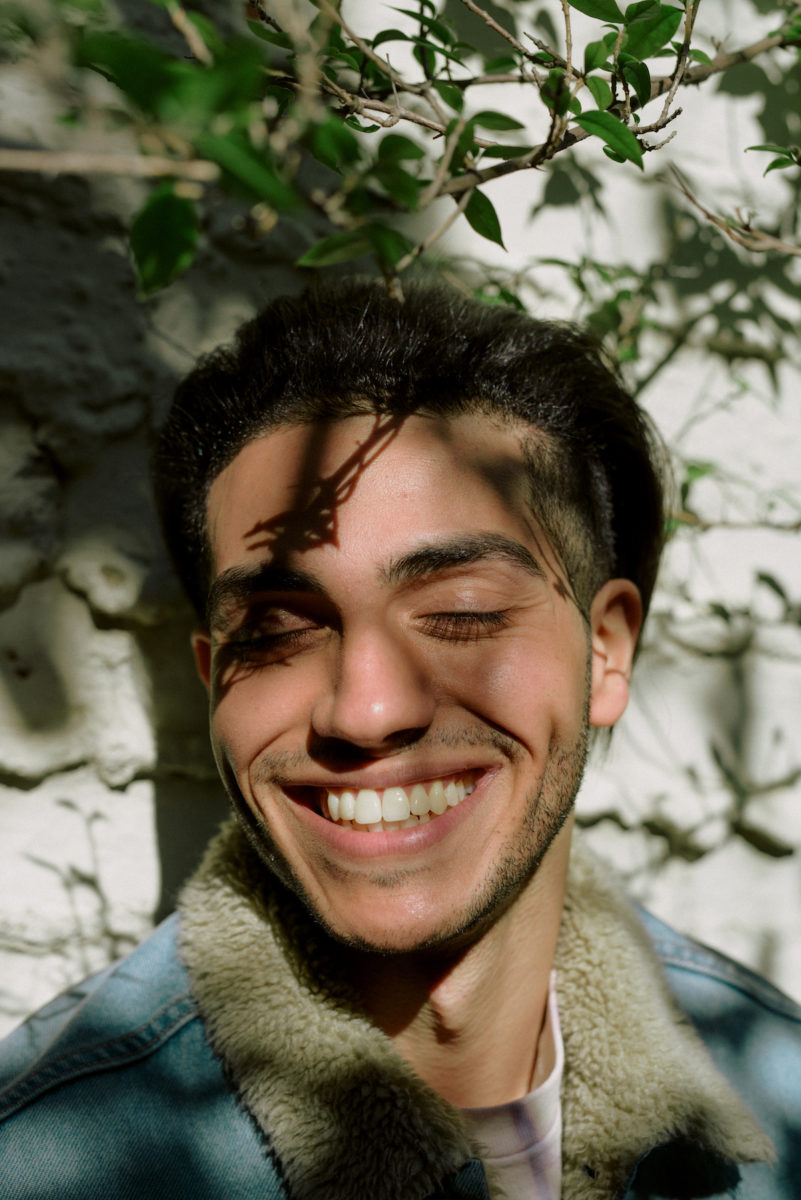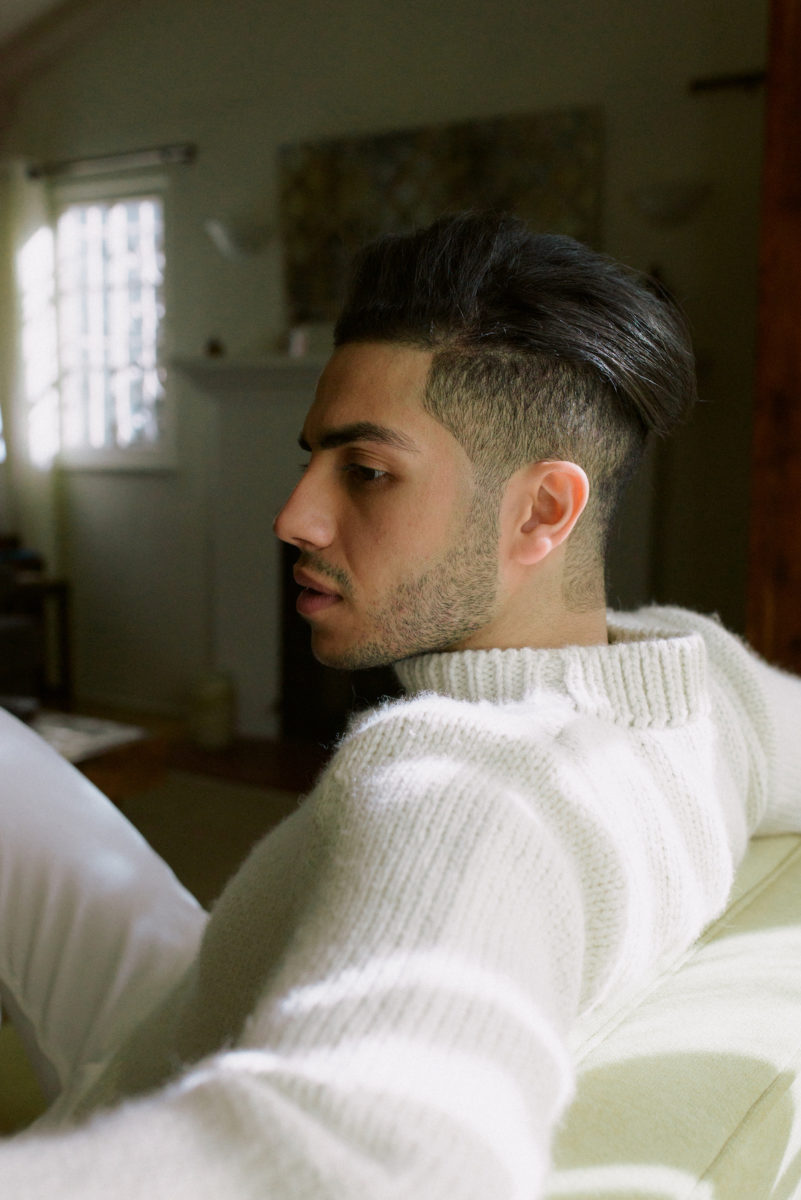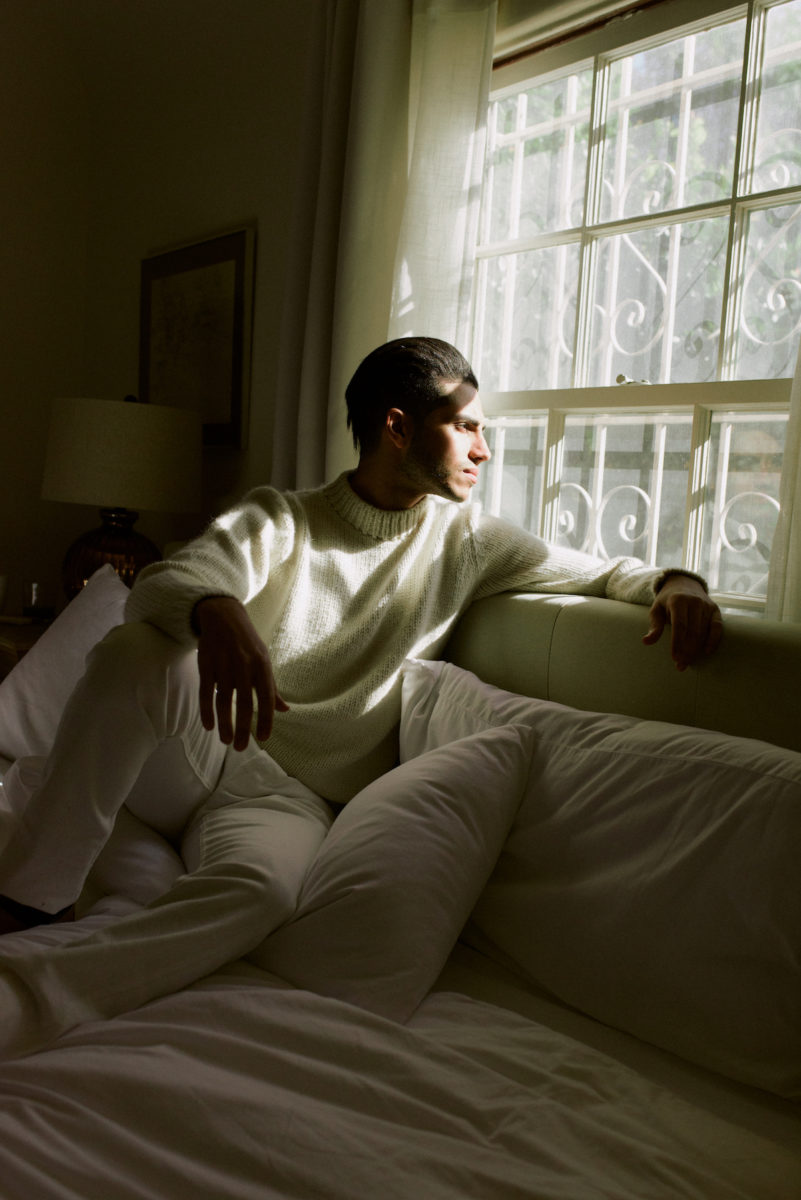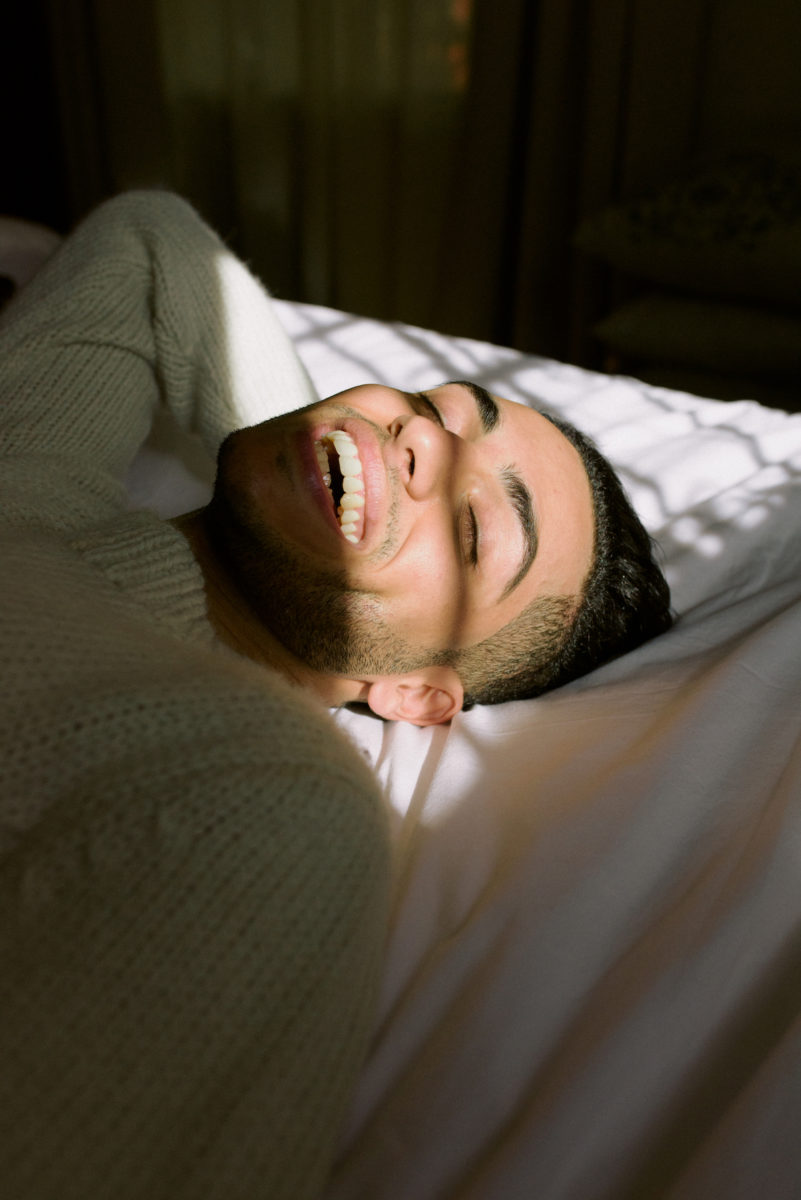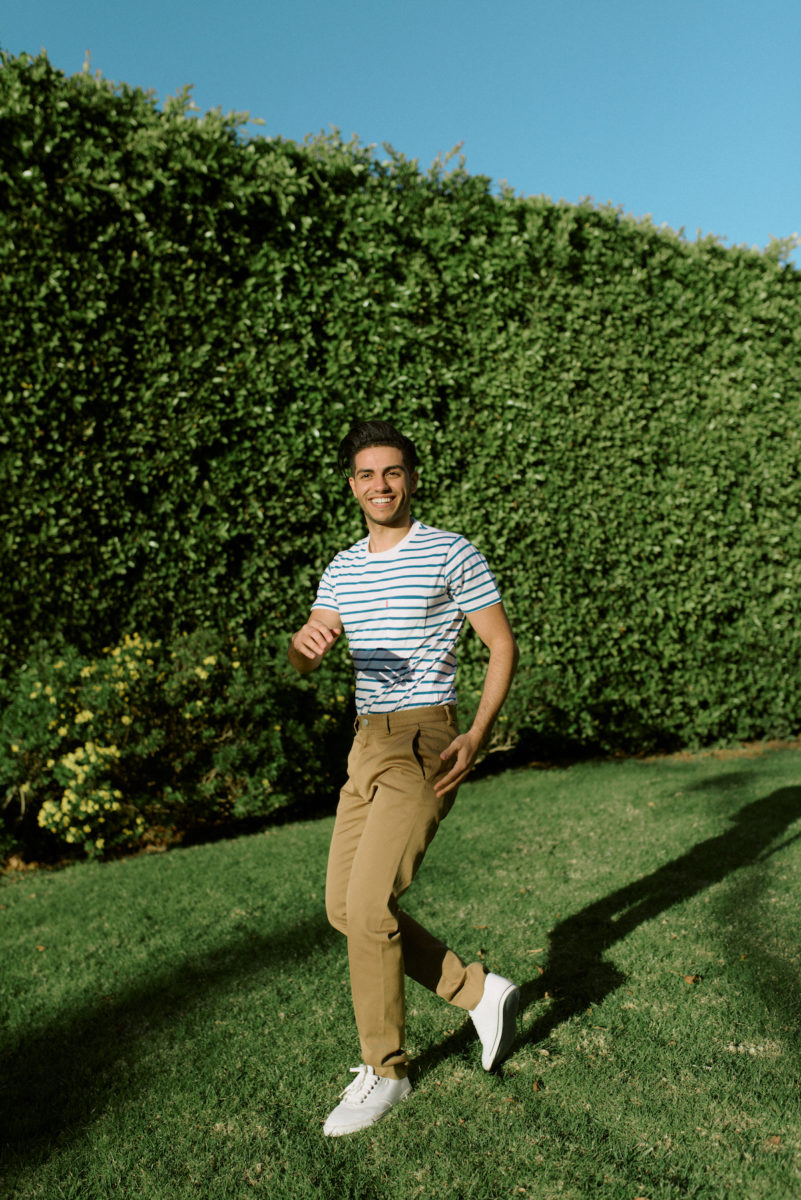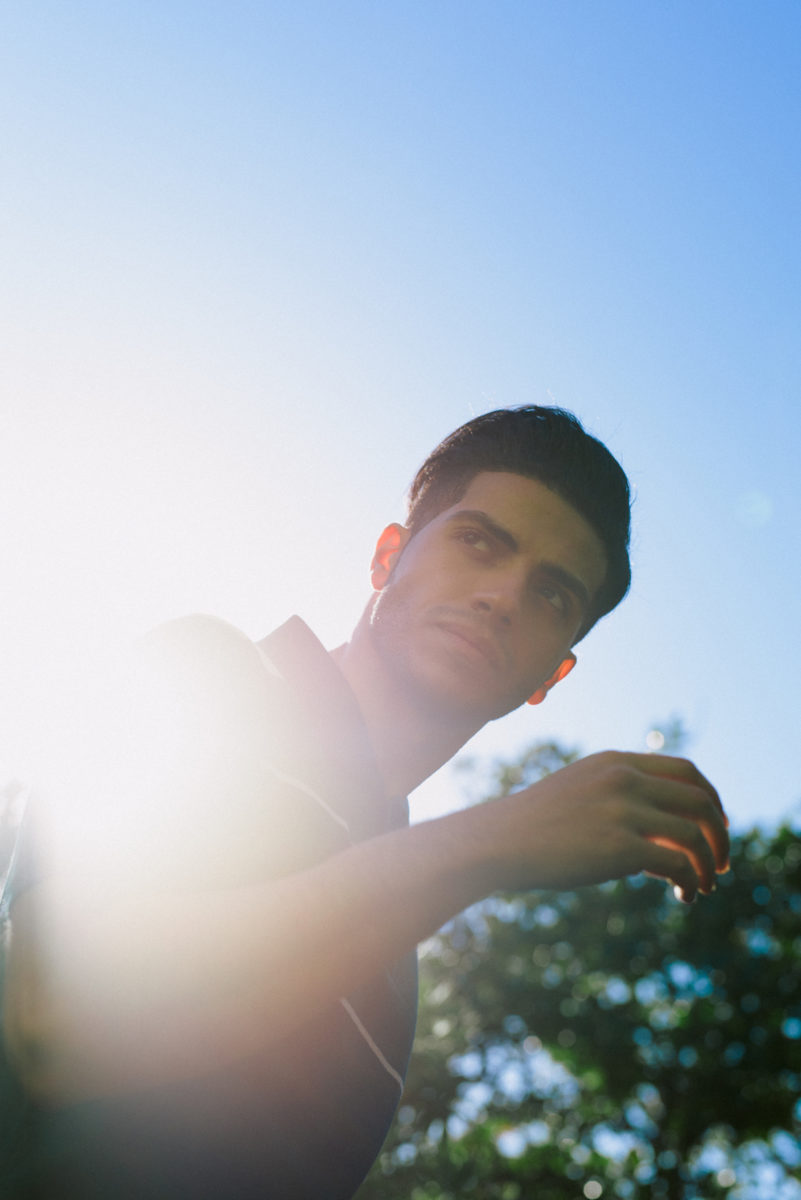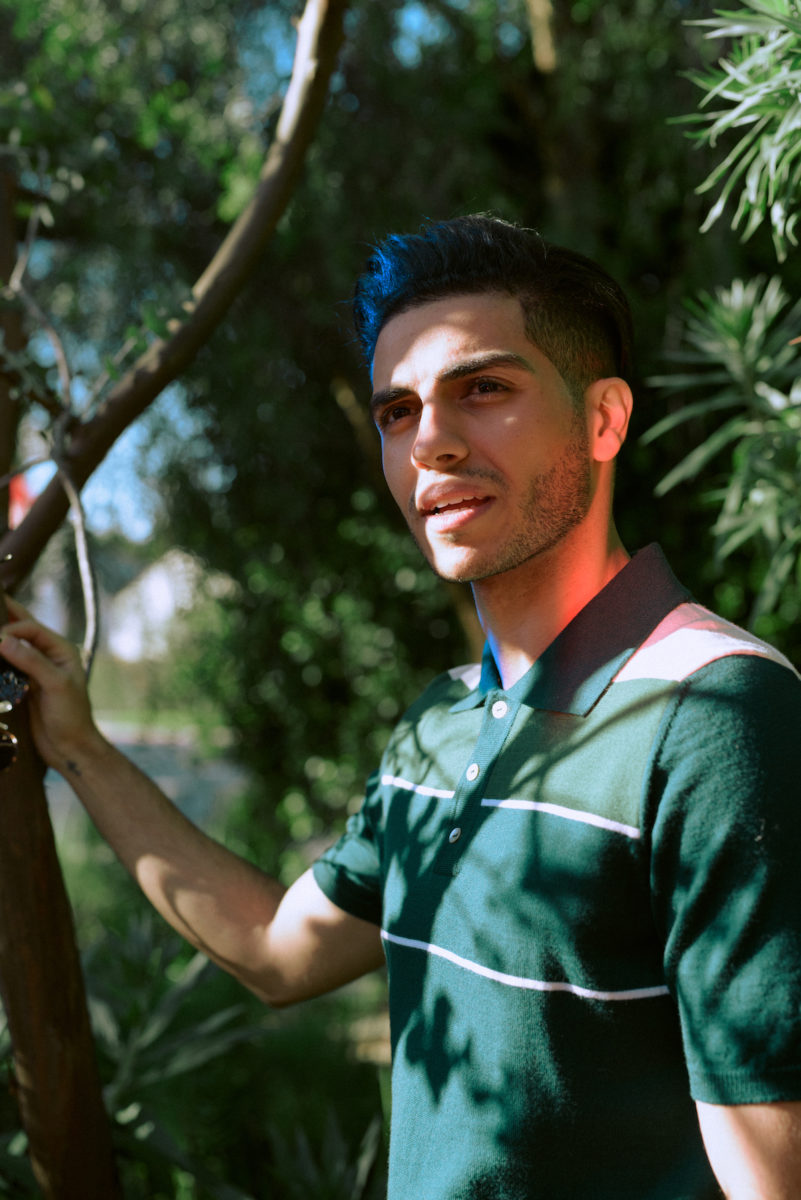After years of feeling boxed in by roles like “Al Qaeda #2,” actor Mena Massoud landed a starring role in Disney’s live-action remake of the classic animated film Aladdin. For issue 08 of Here Magazine, Massoud explains why it wasn’t a magic carpet that took him to the top—it was something else entirely.
“I haven’t done this since Aladdin,” says Mena Massoud, getting into position on a perfectly manicured Los Angeles lawn. He executes a subpar cartwheel, and pops up looking pleased. “Was that all right?!” he asks, in the enthusiastic way a kid might ask their parent to watch them go down the slide.
It’s this same carefree energy that he brings to every part of our cover shoot, from wardrobe selection to grooming (“If I was wealthy, Rachel would move in with me and do my hair all the time,” he says) to lunchtime conversation over Café Gratitude takeout. This is all fairly new to him, after all. The 27-year-old actor is best known in his career thus far for his role in the TV series Tom Clancy’s Jack Ryan, but 2019 will see Massoud’s bona fide big break. Come May, he’ll be known for playing the lead role in Disney’s live-action remake of Aladdin.
And while he’s aware of what an opportunity this role is, he’s careful about the dialogue surrounding it. “I think anytime you get a mass studio film like this, a Disney film or superhero film, like yeah, it’s a big break,” he says. “But I’ve also been grinding since 2011… It’s a very immigrant mentality—I grew up with my dad being like, ‘Don’t ask for favors from people, make it on your own.’ So [I don’t like] this idea of a studio doing me a favor or the industry doing me a favor. I’ve worked very hard to be ready for this opportunity.”
“I’ve worked very hard to be ready for this opportunity.”
Early Life
Massoud grew up in Toronto, immigrating with his family from Egypt at age three. His mother and father worked hard to send Massoud and his two older sisters to good schools. Like many children of immigrants, he felt pressure to become a doctor or engineer, though his memories of being interested in acting go back “as far as I can remember,” he says, recalling his Chris Tucker and Robin Williams impersonations as a child, and his first role as Peter Pan in his elementary school play. With the help of his high school drama teacher, he had actually landed an agent by the time he was 17.
Still, he started college at the University of Toronto, studying neuroscience while continuing to audition. But the balancing act didn’t last long. “I was sitting in calculus class one day, and I was like, ‘I am not going to do this for the rest of my life, there’s no way,’” he remembers. “I actually got up and left.” He completed his degree at Ryerson Theatre School, then worked in restaurants to save up money to secure a visa and move to Los Angeles, where his first living situation was a mattress in a friend’s closet.
Hollywood Is No Magic Carpet Ride
At first, Massoud’s narrative might warrant some comparison to Aladdin’s. But his is not exactly a rags-to-riches story, and in the whole new world of Hollywood, he’s proved to be his own wish-granting genie.
“Growing up, Aladdin was one of the only Disney films where I was like, ‘Oh, that guy looks like me, and that culture is like my culture,’” he says. “I think the reason this film is really special to me and the reason, hopefully, it will be special for a lot of people is that there’s a great deal of ethnic representation in this film that never happens in Hollywood.”
Growing up in Markham, a neighborhood in the greater Toronto area, Massoud says he experienced discrimination but not racism in his mostly white high school. He remembers never being put into basketball games, despite being one of the best players.
“There’s a great deal of ethnic representation in this film that never happens in Hollywood.”
His experience as a man of color in Hollywood also often leaves him feeling benched. “It’s a fight. It’s just a fight,” he says. “My first union role was on a show called Nikita, and I played Al Qaeda #2. And then I got guest stars on shows where I was Salman Zawab or Malik Atassi—very ethnic names.” He points to the cast of Crazy Rich Asians and Egyptian-American actor Rami Malek playing the leading role in Mr. Robot as examples of recent changes to the status quo.
“It will hopefully get to the point where anything can play anything, right? So, a Chinese man can play an Indian and an Indian man can play a Spanish person because we’re all working and there’s equal representation, and who cares, right?”
The Real Aladdin
Despite early concerns that Aladdin would continue a pattern of whitewashing in Hollywood films (critics cited Jake Gyllenhaal as Prince Dastan in Prince of Persia and Christian Bale as Moses in Exodus), Massoud is quick to point out that there’s “one white person and one black person in this film, and everybody else is something else, like Tunisian or Dutch or Iranian, Turkish, Egyptian, Indian, from all over the world.”
The main point he wants to get across, though, is that it’s up to audiences to solidify this step in the right direction. “We all understand that it’s a victory artistically, but people need to go out and support this film, because at the end of the day, it’s a business.” He also points to building change from the ground up—hiring more writers, producers, and directors of color on high-profile projects. “It doesn’t start with the actors, it ends with the actors,” he says.
“We all understand that it’s a victory artistically, but people need to go out and support this film.”
In many ways, the set of Aladdin was a comfortable place for Massoud. Most of the filming happened in the U.K., but the entire team shipped out to Jordan for 12 days to shoot the scenes in the desert. “It reminded me a lot of Cairo, actually. Every morning started off with falafel and fava bean and hummus, baba ghanoush, and pickled vegetables for breakfast. I felt really at home.” At wrap, he and some of the team camped out in the desert with Bedouins, and throughout the trip he was able to speak his family’s native Arabic with the local people he met.
But it was also a crash course in many respects, including the singing, dancing, and stunt work he had to do for the film. “I was definitely out of my comfort zone, and I think whenever you’re out of your comfort zone, you just have to embrace it,” he says, adding, “actually there is not a single cartwheel in Aladdin!” But he did plenty of parkour, and spent the better part of two days 18 feet underwater for the scene where the villain, Jafar, pushes him off a cliff in an attempt to drown him.
“Whenever you’re out of your comfort zone, you just have to embrace it.”
Massoud had plenty of guidance for his first blockbuster role from Aladdin director Guy Ritchie and co-star Will Smith, who plays the Genie. “Will’s the greatest, kindest, most down-to-earth superstar you can think of—like, it’s insane that he’s such an icon, but he’s still so amazing, and he just has a breadth of knowledge and advice,” Massoud gushes.
“The best thing I learned from Will is that it’s never going to be enough if you’re not happy with yourself,” he says. “That really resonated with me, because I’m the kind of person that’s always kind of like, all right, what’s next, what’s next, Aladdin was great, but what’s next? [Will] really struggled with that, and told me that that’s a journey you have to go on as an individual, and it’s never going to go away. That mentality applies to everyone. It’s universal. You have to be at peace with who you are and where you are in your accomplishments.”
Activism
To that end, not all of Massoud’s accomplishments have to do with Hollywood. He started Evolving Vegan, which he calls an “educational platform,” last year, after digging into the environmental and health effects of eating meat.
“Global warming is at an all-time high, and climate change is raging, and I wanted to figure out how I could do my part to help slow that down and prolong the life of Earth,” he says. “I was like, so wait a second, you’re telling me if we took all the land [from dairy farms] to grow vegetables and fruits, we could end human starvation? Yes. And we could end pollution? Yes. Like, it’s just insane.”
“Global warming is at an all-time high… I wanted to figure out how I could do my part.”
He views Evolving Vegan as a safe place for people who want to learn more about becoming plant-based or who want to be involved in the community. He toured 10 cities in North America, including New York, Portland, and Vancouver, over six months for the platform, exploring the vegan restaurant scene in each. “I’ve been plant-based for the past four years, and the reason I don’t like using the word ‘vegan’ on its own, and the reason I started Evolving Vegan, is because the people associated with that word can be very militant,” says Massoud, who still wears leather on red carpets and puts honey in his tea.
He has a series on IGTV chronicling the city tour, and has a cookbook with the recipes he discovered coming out later this year. His altruistic tendencies don’t stop with veganism, though—he’s also interested in starting a foundation in Toronto that supports minorities in theater and film.
Click here for Mena Massoud’s favorite vegan restaurants in Los Angeles.
Evolving Roles
Meanwhile, Massoud’s acting career is taking exactly the kind of turn he’s wished—and worked—for. He plays disgraced Toronto mayor Rob Ford’s special assistant in Run This Town, which premiered at South by Southwest, alongside Ben Platt, Nina Dobrev, and Damian Lewis, and plays the leading man in Reprisal, a revenge show that will premiere on Hulu later this year. His role in the latter as Ethan Hart is particularly notable because it was written for a white male. “I can play a guy named Ethan and not Aladdin or Salman,” says Massoud, visibly pumped.
“Good luck is what is left over after intelligence and effort have combined at their best.”
In thinking through his journey from Toronto to L.A. to Agrabah, Massoud pauses to dig up a note on his iPhone. “I’m going to pull this up because it’s very relevant, it might take me a couple seconds,” he says, scrolling. Then he recites: “‘Luck is the residue of design.’” It’s a quote from Wesley Branch Rickey, the baseball executive who signed Jackie Robinson. The start of the quote reads, “Things worthwhile generally don’t just happen. Luck is a fact, but should not be a factor. Good luck is what is left over after intelligence and effort have combined at their best.”
It turns out that in the real world, far from Agrabah, it’s not about rubbing a lamp at all—Massoud’s wish is his very own command.
Styling by Jenny Ricker. Grooming by Rachel Burney.


